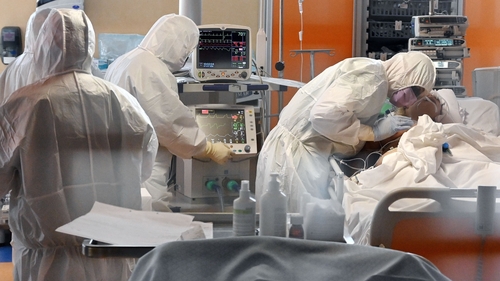
Europe to see rise in deaths in coming months - WHO
The World Health Organization expects Europe to see a rise in the daily number of Covid-19 deaths in October and November, the head of the body's European branch has said.
"It's going to get tougher. In October, November, we are going to see more mortality," WHO Europe director Hans Kluge said, as the continent currently experiences a surge of cases though the number of deaths has remained relatively stable.
The resurgence is, however, expected to lead to an increase in daily deaths, the WHO said.
Mr Kluge's comments come as the WHO has reported nearly 308,000 new cases over the past 24 hours.
"It's a moment where countries don't want to hear this bad news, and I understand," Mr Kluge told AFP in an interview, stressing that he wanted to send the "positive message" that the pandemic "is going to finish, at one moment or another".
The WHO Europe's 55 member states are holding an online meeting today and tomorrow to discuss their response to the new coronavirus and agree on their overall five-year strategy.
However, Mr Kluge, based in Copenhagen, raised a warning finger to those who believe that the development of a vaccine will bring an end to the pandemic.
"I hear the whole time: 'the vaccine is going to be the end of the pandemic'. Of course not!," the Belgian said.
"We don't even know if the vaccine is going to help all population groups. We are getting some signs now that it will help for one group and not for the other," he said.
"And then if we have to order different vaccines, what a logistical nightmare!"
"The end of the pandemic is the moment that we as a community are going to learn how to live with this pandemic. And it depends on us and that's a very positive message," he said.
The number of cases in Europe has risen sharply in recent weeks, especially in Spain and France.
On Friday alone, more than 51,000 new cases were reported in the 55 countries of the WHO Europe, which is more than the highest peak in April, according to the organisation.
Speaking on RTÉ's News at One, WHO spokesperson Dr Margaret Harris said Europe has, for the last couple of weeks, has seen large rises of cases in a lot of countries, and in some countries, which hark back to the difficult days of March and April.
She said: "We are seeing the result of not really accepting the need to continue to suppress transmission throughout the summer.
"Whenever there's coronavirus in the community, it's potentially everywhere and whenever it's anywhere in the world, it's potentially everywhere."
Dr Harris said it is important to understand "that we are a lot better at dealing with this".
She said if there is widespread transmission, it is a numbers game, that people who vulnerable are more likely to be infected and are more likely to be hospitalised.
Dr Harris said it is concerning that those who are not hospitalised, may end up with long-term conditions and she referred to a study in the US found that healthy college athletes who got a mild form of the virus, some of whom were asymptomatic, one in seven of them went on to develop cardiomyopathy, or significant heart disease.
The World Health Organization says data to date suggests 80% of Covid-19 infections are mild or asymptomatic, 15% are severe infection, requiring oxygen and 5% are critical, requiring ventilation.
Generally, you need to be 15 minutes or more in the vicinity of an infected person and within two metres of them, to be considered at-risk, or a close contact.